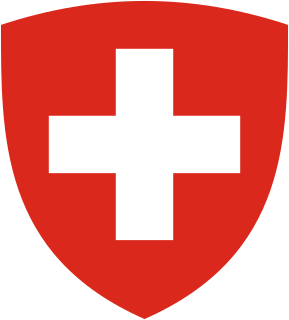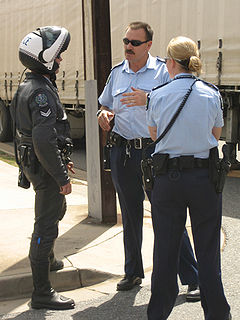
In law, treason is criminal disloyalty to the state. It is a crime that covers some of the more extreme acts against one's nation or sovereign. This usually includes things such as participating in a war against one's native country, attempting to overthrow its government, spying on its military, its diplomats, or its secret services for a hostile and foreign power, or attempting to kill its head of state. A person who commits treason is known in law as a traitor.
Culpable homicide is a categorisation of certain offences in various jurisdictions within the Commonwealth of Nations which involves the illegal killing of a person either with or without an intention to kill depending upon how a particular jurisdiction has defined the offence. Unusually for those legal systems which have originated or been influenced during rule by the United Kingdom, the name of the offence associates with Scots law rather than English law.
Third-degree murder is a name for a category of murder defined in the United state laws states in the United States, specifically Florida, Minnesota, and Pennsylvania. It was also formerly defined in New Mexico and Wisconsin. Depending on the state, third-degree murder may include felony murder regardless of the underlying felony, felony murder only where the underlying felony is non-violent, or depraved-heart murder. It is punishable by a maximum of 40 years imprisonment in Florida and Pennsylvania, and 25 years imprisonment in Minnesota.
The legal age of consent for sexual activity varies by jurisdiction across Asia, from age 12 to 21 years of age. The specific activity engaged in or the gender of its participants can also be affected by the law. Below is a discussion of the various laws dealing with this subject. The highlighted age refers to an age at or above which an individual can engage in unfettered sexual relations with another who is also at or above that age. Other variables, such as homosexual relations or close in age exceptions, may exist, and are noted when relevant, for example in Indonesia.

The ages of consent vary by jurisdiction across Europe. The ages of consent are currently set between 14 and 18. The vast majority of countries set their ages in the range of 14 to 16; only four countries, Cyprus (17), Ireland (17), Turkey (18) and Vatican City (18), do not fit into this pattern. The laws can also stipulate the specific activities that are permitted or differentially specify the age at which a given sex can participate. Below is a discussion of the various laws dealing with this subject. The highlighted age is that at which, or above which, an individual can engage in unfettered sexual relations with another who is also at or above that age. In 2014, the self-declared state of the Turkish Republic of Northern Cyprus lifted the ban on sodomy, decriminalizing homosexual sex. All jurisdictions in Europe have an equal and gender-neutral age limit.
Capital punishment in Croatia existed until 1990 when it was constitutionally abolished. The last execution had taken place under Yugoslavia in 1987.
Philippine Criminal Laws is the body of law and defining the penalties thereof in the Philippines.
Laws regarding incest vary considerably between jurisdictions, and depend on the type of sexual activity and the nature of the family relationship of the parties involved, as well as the age and sex of the parties. Besides legal prohibitions, at least some forms of incest are also socially taboo or frowned upon in most cultures around the world.
In Denmark manddrab (manslaughter) is the term used by the Danish penalty law to describe the act of intentionally killing another person. No distinction between manslaughter and murder exists. The penalty goes from a minimum of five years to imprisonment for life. The standard punishment for manslaughter - i.e. where there are neither aggravating or mitigating circumstances - is 12 years imprisonment.
Under the German penal code, Strafgesetzbuch, there are two sections relating to murder:
By Italian law, murder is regulated by articles 575-582, 584-585, and 589 of the Codice Penale.
By Dutch law, moord (murder) is the intentional and premeditated killing of another person. Murder is punishable by a maximum sentence of life imprisonment, which is the longest prison sentence the law allows. A common misconception is that the maximum sentence is 30 years : this is the longest sentence that can be imposed other than life imprisonment. Intentionally killing another person without premeditation is called doodslag (manslaughter) and carries a maximum sentence of fifteen years imprisonment or life imprisonment when committed in aggravated circumstances or as an act of terrorism.
The Portuguese Penal Code was adopted in 1982 and has been revised on several occasions, most recently in 2007. It devotes a whole chapter on "crimes against human life". In fact, the very first crime addressed on that code is murder.
According to the modern Russian Criminal Code, only intentional killing of another human considered as a murder. The following types of murder are defined:
According to the Romanian penal code, the maximum punishment a person can get for the unlawful killing of another is life imprisonment.

In Switzerland, articles 111 to 117 of the Swiss Criminal Code detail the various scenarios in which the killing of another person is punishable. Articles 112 to 117 are leges speciales to article 111, meaning that when the conditions of one of the latter are met, article 111 will not be invoked.
Currently, there is no life imprisonment in Croatia. The Criminal Code prescribes long-time imprisonment - 20 to 40 years - for the most severe criminal offenses. According to the Criminal Code, the maximum sentence is 40 years, even if the sum of sentences for each convicted count exceeds 40 years.
Articles 108 through 108-C of the Penal Code of Peru define crimes similar to those known as murder in Anglophone countries. The term asesinato ("murder") is no longer used in the Penal Code since 2014.
Murder in Cuba is classified into three major categories: murder with special circumstances, murder, and manslaughter.
Under the Criminal Code of Georgia, crimes involving homicide are classified as intentional killing, intentional killing under aggravating circumstances, killing at the victim's request, intentional murder in a state of sudden, strong emotional excitement, intentional infanticide by a mother, murder by exceeding the self-defence limits, murder by exceeding the extent required for seizing a perpetrator, killing by negligence.





